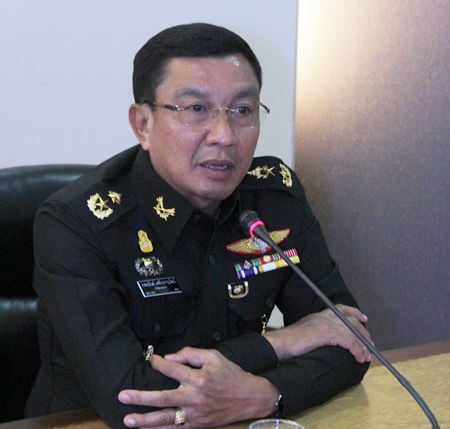
PATTAYA – In case beach chair and umbrella vendors didn’t hear them the first time, the military reaffirmed it is ending the monopoly corrupt local politicians and “influential” families have had on large swaths of Pattaya beaches for decades.
Maj. Gen. Popanan Luengpanuwat, head of the National Council for Peace and Order in Banglamung, told 200 vendors at an Aug. 22 meeting with police and local officials that they have a limited, government-set term during which they can operate. Once that term is over, so are they.
Popanan, also an appointee to the Pattaya City Council, directed most of his comments to vendors operating on Wong Amat, Koh Larn, Cozy and Pratamnak beaches, who have lagged in complying with new military policies imposed on Pattaya and Jomtien beaches.
Under the new regulations, operators are limited to renting only one 9-by-7-meter plot, forbidden from transferring their franchise to children and relatives, subjected to bidding for their franchise every year, required to put out chairs only on request, and barred from cooking on the beach.
The operators also were told flatly that tourists aren’t required to use their chairs and can sit on blankets or mats anywhere they want on the beach, even in front of the rental chairs. Any vendor caught chasing away non-customers – as several got caught on video doing in recent years – will face stern action, Popanan vowed.
The major general said vendors are the area’s main beaches are adhering well to the new policies, but operators on the smaller beaches are not. He gave them five days to fall into line.
While the military has claimed the intent of the new policies simply is to return nature to tourists, their true aim is the corruption that has allowed well-connected families to basically “own” large parts of Pattaya’s public beaches for generations.
Until recently, many large vendors operated as many as five contiguous 7-by-7-meter plots, subleased them to friends and relatives at a markup, passed on the franchises to children as inheritance and held on to their licenses for decades.
The new rules do away with all of that, limiting franchisees to one plot, forbidding transfer or sublease of the license and putting all plots up for a random drawing every year.
Critics have said the crackdown was long overdue.
Three months after the 2014 military coup, then Chonburi Permanent Secretary Chawalit Saeng-Uthai – now the deputy governor – said 252 of vendors on Pattaya, Jomtien and Dongtan beaches insisted they owned the sand on which they operate.
Chawalit bluntly stated that local government corruption supported the false beliefs that individuals could own public land.
He said vendors told his 10 investigative teams that they were paying 5,000-50,000 baht a month to “owners” of their 7-by-7-meter lots. Half have opted to “buy” the public property for up to 1 million baht.
All the money went into the pockets of “government officials” who he declined to, or was unable to, identify. Vendors who rent their lots told him government officials and city politicians approved their rental contract.
Chawalit noted, however, that many of those renting vendors were never registered with the city, again pointing to private deals between the operators and the government officials who approved them.




